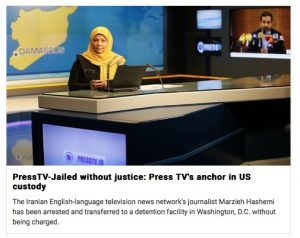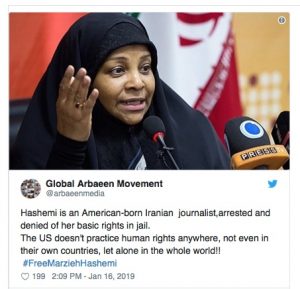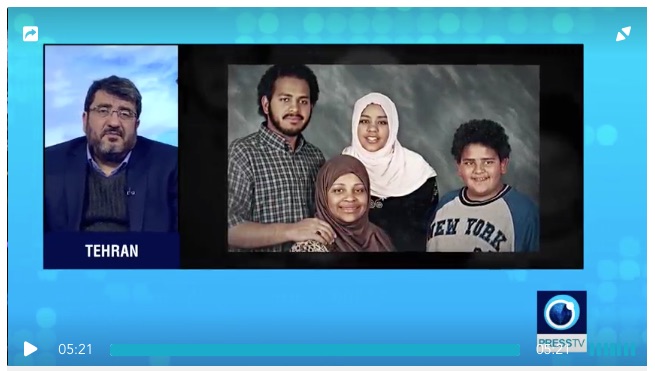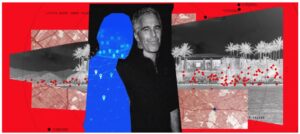PressTV
An American law expert tells Press TV that the arrest and imprisonment of its journalist and news presenter, Marzieh Hashemi, on unspecified charges runs contrary to the American Constitution, which forbids “unreasonable” seizures.
Hashemi, an American-born journalist based in Iran, was detained on the weekend upon arrival at the international airport in St. Louis, Missouri, without any explanations, her family and friends told Press TV on Wednesday.
The journalist was later transferred by US federal agents to a detention facility in Washington, while no formal charges have been pressed against her.
The US Justice Department and the FBI continued on Thursday to refuse comment on the detention of Press TV’s anchorwoman.

Hashemi’s son, Hossein, has told Press TV’s website that he and his siblings have received subpoenas to appear before the grand jury in Washington, D.C.
“Currently, the information that is available to us is that she has been detained as a material witness. There aren’t any charges against her,” Hossein told the Iranian English-language news channel.
The US law defines a material witness as a person who is presumed to have information about the subject matter of a lawsuit or criminal prosecution, which is critical to the outcome of the case or trial.
In an interview with Press TV, Ricardo J. Bascuas, a professor at the University of Miami School of Law, elaborated on the legal aspects of Hashemi’s imprisonment.
He said “the Fourth Amendment to the US Constitution plainly makes it unconstitutional to detain any witness because, by definition, there is never “probable cause” to believe a witness committed a crime, adding that the Fourth Amendment forbids “unreasonable” seizures.”
“An unreasonable seizure is one that is irrational or arbitrary — i.e., based on hunches or gut feelings rather than facts. By definition, there is never good cause to believe a witness probably committed a crime. So, the Fourth Amendment plainly forbids arresting a witness,” he added.
The expert went on to say that “when federal authorities arrest a material witness despite the Fourth Amendment, they are making up the rules as they go…Only the government knows whether a material witness is also a target, a suspect, a person of interest, or just someone they can’t rule out as one of those things.”
Bascuas added that the word “material” cannot be precisely defined, giving the government a free hand to arrest just anyone “especially when the ‘proceeding’ is an investigation that only the government knows the contours of.”
Hashemi, a Muslim convert, was in the US to visit her cancer-stricken brother and other family members. She was allowed to contact her family only two days after her arrest.
The journalist told her daughter on the phone that she had been subjected to ill-treatment at the detention facility, where she is being kept in manacles “like a criminal.” She has also been denied halal food and prevented from observing his Islamic dress code.
On Wednesday, Peyman Jebelli, head of the Islamic Republic of Iran Broadcasting (IRIB)’s World Service, would take any necessary legal action to secure the release of Hashemi, holding the US responsible for her health.

Iranian Foreign Minister Mohammad Javad Zarif also censured Hashemi’s arrest as “an unacceptable political move,” and said, “She is the wife of an Iranian person and is therefore an Iranian citizen and we see it as our duty to defend the rights of our citizens.”
‘US arrested Hashemi over her religious, revolutionary tenets’
Speaking on the sidelines of a cabinet meeting on Wednesday, head of the IRIB Abdolali Ali Asgari said Hashemi’s apprehension was a result of her Islamic, freedom-seeking and revolutionary tenets.
Asgari condemned the US government’s arrest of the Iranian journalist, hoping that she would be set free as soon as possible.
In another part of his remarks, the IRIB chief slammed America’s double-standard approach to freedom of speech, saying such dual behavior was part of the US government’s nature.

“Double-standard behavior is in the nature of the US government; an arrogant government, which likes those who obey it and does not tolerate the ideas of those who oppose it,” he said.
Ali Asgari concluded by saying that such positions adopted by the United States were the root cause of all bloodshed and terrorist groups in the Middle East region.
‘US must end political game’
Reactions continued to pour in on Thursday, with a special aide to Iran’s parliament head denouncing the US for the “political” detention of Hashemi and warning Washington of repercussions if it fails to immediately release her.
In a tweet, Hossein Amir-Abdollahian, Iranian Parliament Speaker Ali Larijani’s special advisor on international affairs, said the United States has started a “political game” by detaining Hashemi.
“If the @PressTV journo is not released very immediately, this game won’t end by the US,” warned the official.
‘International institutions must weigh in’
Iran’s High Council for Human Rights also issued a statement in condemnation of the US, calling on international institutions to “react immediately” and help secure Hashemi’s release.

Hashemi’s arrest and ensuing mistreatment in US custody are ” a clear manifestation of arbitrary arrest and torture” and amount to a “blatant violation of freedom of thought and expression.”
“The US administration has a long background of big crimes against humanity, and has the blood of thousands of innocent people, especially children, on its hands; it is not at all unlikely for it to breach international humanitarian standards” the statement added.
The statement further said, “We expect the European countries, which claim to be human rights advocates, as well as the United Nations, its Human Rights Council and the High Commissioner for Human Rights to swiftly and transparently condemn this inhumane move and make serious efforts to secure Ms. Hashemi’s release.
Lebanon’s Hezbollah, Iraq’s Nujaba movements slam Hashemi’s detention
Lebanon’s Hezbollah resistance movement also slammed Hashemi’s “arbitrary” detention.
The movement’s Media Relations Office also censured US authorities for disrespecting Hashemi’s Islamic beliefs in custody.
Meanwhile, spokesman of Iraq’s Harakat Hezbollah al-Nujaba Hashim al-Mousawi denounced “in the strongest words” Hashemi’s detention as “a clear violation of the rights of journalists as well as free speech.”
Hashemi’s family members and media activists have launched a social media campaign with the hashtags #FreeMarziehHashemi and #Pray4MarziehHashemi in support of the detained journalist.



